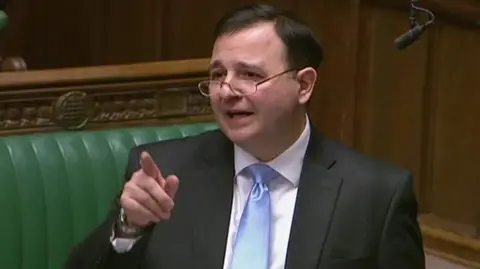MPs don't have to be saints, says new standards watchdog
 House of Commons
House of CommonsMPs should not be expected to be "saints", the new chair of the Commons standards committee has said, as he called for punishments for breaking minor rules to be less severe.
In an interview with The House magazine, Conservative Alberto Costa suggested that where a "minor failing" at work did not involve corruption, MPs should not have to "stand up and publicly apologise".
MPs have to follow a strict code of conduct governing lobbying, payments for parliamentary advice and declaring interests, while also upholding the reputation of Parliament.
Breaching these rules can result in an MP being investigated, with the cross-party standards committee determining sanctions in more serious cases.
The standards committee is always chaired by a member of the main opposition party in the Commons. Costa was elected to the role in September in a vote of all MPs, replacing Labour's Harriet Harman.
In June 2023, Costa was one of four Conservative members of the Commons privileges committee when it unanimously found that former Prime Minister Boris Johnson had deliberately misled Parliament over coronavirus lockdown parties at Downing Street.
In his House magazine interview, he suggested former SNP MP Margaret Ferrier, who was suspended from Parliament for 30 days for breaking Covid lockdown rules and was then unseated in a by-election triggered by a recall petition, had been treated too harshly.
Ferrier had travelled by train from London to Glasgow after testing positive for the virus. She was later prosecuted and given community service.
He suggested this was not an example of corruption but, rather, "there go I but for the grace of God".
He added that "with a bit of compassion you might understand why she'd done what she did".
Costa told The House it was "generally right" that MPs were "held to a higher standard".
But that standard should not be so high "that you are requiring saints to stand forward for election", he added.
The South Leicestershire MP said: "I am not and never have been a saint. I am a fallible human being like anyone else. To err is human."
Costa also argued that allegations of bullying – which has prompted investigations and resignations by high-profile MPs - were a form of misconduct that could be dealt with privately.
"I would have thought that if you were to complain at your place of work, they would try and mediate in private. They would say 'look what's happened here?', and maybe get a private apology from the person."
He said he was concerned that "it might be a little bit too easy to complain that an MP is bullied, or somebody else is bullied."
In 2020, a new Independent Expert Panel took over responsibility for cases involving bullying, harassment or sexual misconduct by MPs.
Costa added the public were calling for "more normal people" to "represent us, that look like us, that act like us. Well, when you put a mirror up to society, you're going to get all sorts of people."
"One of the things I'm not very comfortable with is when an MP commits an administrative error - a really minor error where they fail to disclose a modest interest - and they breach the 28-day limit [to declare it]. It's very easy to do that."
The standards committee was set up to oversee MPs' conduct in 2012, in the aftermath of the expenses scandal.
Half of its 14 members - seven - are from outside Parliament.
